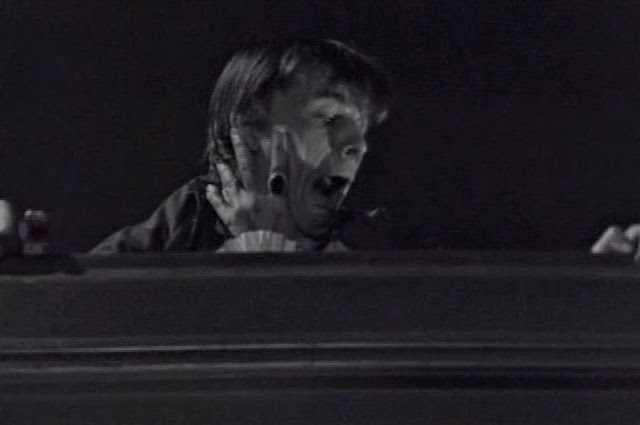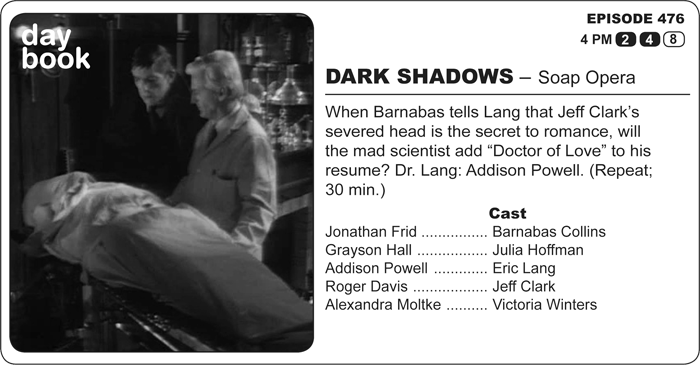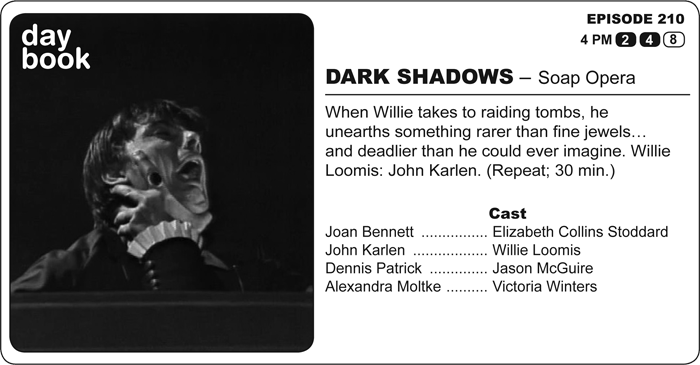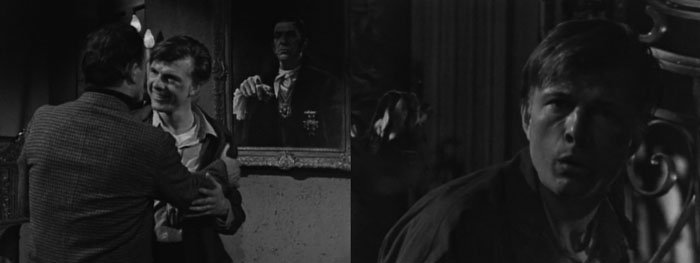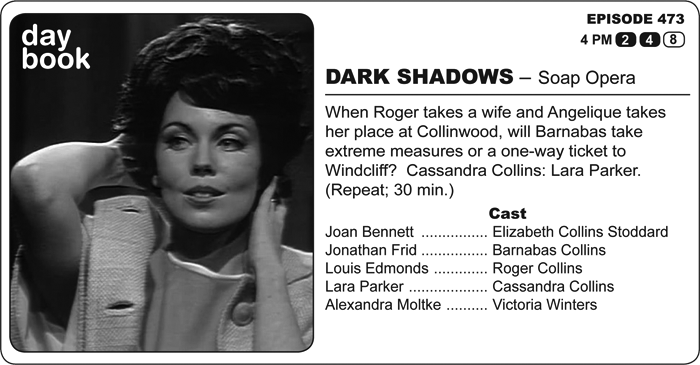By PATRICK McCRAY
Taped on this date in 1967: Episode 210
Willie’s scheme to rob the Collins family of its wealth may cost him far more than riches when the dead rise to take vengeance. Timothy Gordon: Barnabas Collins. (Repeat; 30 min.)
As Liz pays off Jason to leave Collinwood, Willie escapes the house to plunder the Collins mausoleum. As he cracks open a sarcophagus behind a hidden door, a hand from within the tomb grasps him by his throat.
This is the first episode that most of us in the pre-streaming generation ever saw. It may not have been the first Dark Shadows episode, but in every way that matters, it's the first episode of Dark Shadows.
We generally avoid thinking of it as the pilot of the series, because, let's face it, it isn't. To the delight of literalists and pedants everywhere, the first episode is cleverly entitled, “Episode 1.” (And my favorite part is where Burke Devlin has to talk David into the pod race so that he can get a sample of his blood.) But 210 is the first that matters. Yeah, I said it. And I’m not just being a weisenheimer. If you start with today’s episode, are you really missing much? Clearly not. We didn’t see those early episodes for decades, and it didn’t slow us down at all. More than most other shows, Dark Shadows is true theater. It deals with consequences rather than causes. That means that there is always some kind of past we didn’t see. There are always, even for completists, “unaired episodes” being referred to. Victoria’s Sanka is barely in the cup before she finds herself over a decade behind, if dealing with Burke and Roger, or twice that time if dealing with Liz, Carolyn, and the case of the slightly bent fireplace poker. We’ve always missed something on the show. Isn’t that the very core of the haunted house mythos? Protagonists in stories like that only exist because of what they don't know. Because of the threats they're trying to solve… threats that came from someplace else. Usually wrapping them up in problems they weren't even alive to help create.
The Dark Shadows that begins with this episode was a success to the extent that, 55 years later, you're reading about it and I'm writing about it. So it stands to reason that this episode contributed to that success in a unique way because it started it. Most people might look at episode 210 and conclude that it works because of its last five seconds. While you would think it's appropriate to give the hand a hand, it works as a pilot in other regards. In more important regards. Barnabas is hardly the first vampire we see in the episode. In fact, all of the men in the episode are vampires to one extent or another. Jason is exploiting Liz. Willie is exploiting Jason and attempting to exploit the Collins Legacy. And while the women are largely victimized by this, I'm not sure that you can call them victims. They certainly don't act like it. Liz legitimately thinks that she is ending the situation, and she comes off as a matriarch who seems very good at ending situations she wants to see buried in a sea chest in the cellar. Which is probably why Roger had gas logs installed in the fireplace. Still, Liz clearly has secrets, and Jason knows them to the extent that he’s calling way too many shots for a man with a hat like that.
Villains and heroes are immediately evident. Liz is dancing for Jason like his name’s Bob Fosse, and that immediately roots us in a world where aristocracy is a ramshackle lie. But Jason also seems under the thumb of his own underling’s unpredictability. He’s the one pleading to Willie to come clean about his secret plans, and Willie taunts Jason with his ignorance of them. Jason’s sole power, we quickly see, is in Knowing Things, so this stymies our would-be heavy to a point where he seems downright human. Perhaps more so than the austere Liz. Certainly more so than the vaguely sanctimonious Victoria. These may be the forces of good, but evil seems more compelling and strangely identifiable. Because evil is just as powerless as we are in the face of a raw stupidity that is too dim to see the limits of its own great ideas. Hence, we see Willie’s ability to keep everyone subordinate… even more than the show’s blackmailing mastermind or the bedrock of Old Money American Power.
Even before the long pantomime of Solving the Puzzle of the Mausoleum, we are treated to a compelling story about the collapse of American power and the strange charm of moral corruption via Jason’s Irish lilt. But it’s more than that. All of these people in the power chain have fooled themselves into thinking they are the top dogs while being knowingly undermined by the guys right underneath. That’s the paranoia that defines the American identity. Live by the redneck, die by the redneck. The only one who didn’t get the memo is Willie, whose clues to the family jewels are the ultimate wardrobe of Emperor’s New Clothes. They will only lead him to death, which is all that’s below him on the ladder down from the Olympus of Collinwood.
Sure, Willie. You go exploit the rich. Spend it fast, baby. What you don’t know is that death has a lot of plans for you. And we love the ending because we all know what it’s like to be taken advantage of. Maybe this episode of Dark Shadows is strongest as a standalone, ending in a profoundly Rod Serling-esque place. Seeing it end like this is to see that at least one person isn’t playing the game. Barnabas has no moral inversion because a dead man has no need for moral order at all. It’s a relief that the cold and misanthropic universe -- the one that gives cancer to infants -- will also turn the relentless cruelty of its inevitability toward even the worst. The Willies of the world may think they have it by the ass, but death truly does come for us all.
It’s just that in 210, we can finally shake death’s hand. You know, after it chokes the life out of He Who Thought He Could Get Away With It. The painting of Barnabas serves as a warning of this, but no one is paying attention.
People in the house see the regalia on Barnabas and talk about how he liked to wear jewelry. But that’s not jewelry. He’s bedecked in the honors of war. These are the medals of a soldier. A decorated one. Barnabas Collins represents the strength that built Collinwood. A strength whose apparent absence allows a grubby second-hander like Jason to victimize Liz, and for Willie to keep Jason equally off-balance.
Only, it’s a strength that is not absent. Just patient. It is a strength so undeniably resilient that even death is powerless to stop it.
Through it, in a fashion, Liz has her revenge. Willie is trapped by the literally unthinkable, and we know that it’s only a matter of time until Jason is, as well.
Perhaps we didn’t tune in to episode 211 to see if Willie survived. Perhaps we tuned in to make sure that he didn’t.
And then everything changed.
This episode was broadcast April 17, 1967.

